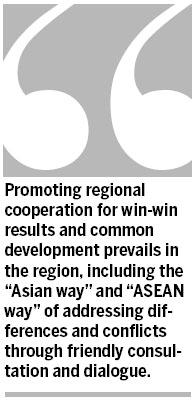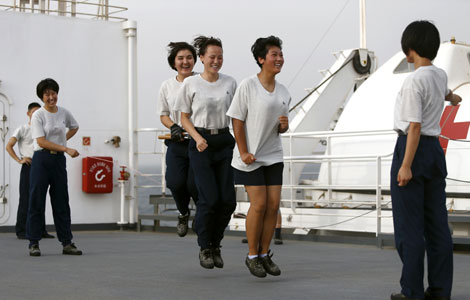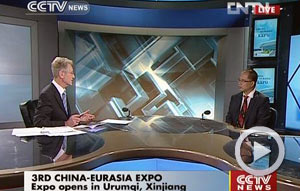Upgrading the partnership
Updated: 2013-09-03 09:33
By Chu Hao (China Daily)
|
|||||||||||
With China's accession to the World Trade Organization in 2001, China and ASEAN started the groundbreaking FTA negotiation process the same year, and the two sides then expanded their cooperation to political, security and strategic areas, including China's signing of the Declaration on the Conduct of Parties in the South China Sea, becoming party to the Treaty of Amity and Cooperation, the establishment of a strategic partnership, and laying the framework foundation for China-ASEAN comprehensive institutional cooperation.

Other cooperation growth points have been fostered. The two sides have chosen to work together on the easiest areas first to try and realize mutual benefits through expanding common interests in economic cooperation and non-traditional security cooperation and shelving disputes for the time being. The two sides have maintained good cooperation in the Asian Regional Forum, 10+3, East Asia Summit and other mechanisms. There are also various cooperative measures ranging from high-level exchanges, periodic multilateral meetings, trade investment and financial cooperation to assistance, education and cultural exchanges and so on.
Reviewing the past 22-year development of the partnership between China and ASEAN, the two sides have laid a broad and solid foundation for the future. China's friendly relations with ASEAN member countries, as the foundation of bilateral cooperation, continue to deepen to varying degrees. At the same time, with China and ASEAN playing an increasingly important role in the East Asian integration process, interdependence between them will further strengthen.
The 10th anniversary of the establishment of the China-ASEAN strategic partnership is a new opportunity to take relations to a higher level.
The author is a research scholar at the Institute of South and Southeast Asian and Oceania Studies, China Institutes of Contemporary International Relations.
Related Stories
Ties with ASEAN set to get broader, deeper 2013-09-03 07:16
China to enhance strategic co-op with ASEAN 2013-09-03 04:37
China-ASEAN cooperation drives investment westward 2013-09-02 08:44
Chang calls for closer ties with ASEAN members 2013-08-30 07:29
Today's Top News
Senior official removed from office in graft probe
Police reveals more about GSK China's violations
Cooperation with Eurasia against terrorism urged
Assad slams Western accusation
Premier Li sees opportunities despite dispute
Xi's visit to Turkmenistan lauded
Trending news across China
Home prices keep rising in August
Hot Topics
Lunar probe , China growth forecasts, Emission rules get tougher, China seen through 'colored lens', International board,
Editor's Picks

|

|

|

|

|

|





